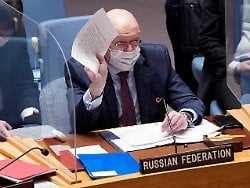“You want it to happen”
Russia accuses West of “war hysteria”
01/31/2022 8:42 p.m
At a UN Security Council meeting, Russia denied allegations that it was planning an attack on Ukraine. The US and the West engaged in “megaphone diplomacy” and disseminated propaganda. In addition, there are not 100,000 soldiers on the Ukrainian border.
Russia has dismissed warnings from the United States about the deployment of troops on the Ukrainian border in the UN Security Council as war hysteria. At the first public confrontation between the two sides before the most powerful UN body, US Ambassador Linda Thomas-Greenfield in New York spoke of the “largest mobilization of troops in Europe in decades”. Russia’s representative Wassili Nebensja replied: “The discussions about the imminent danger of war are provocative in and of themselves. They almost call for it. They want it to happen.”
The Russian diplomat pointed out that his country strictly rejects all allegations of planning an invasion. “And I will now (also) do that.” The West spreads propaganda and operates “megaphone diplomacy”. The US requested the meeting because the West feared a Russian invasion of Ukraine, a former Soviet republic. Russia – like the United States, has always been a UN veto power – could not prevent the session.
Rejection of war before UN would have “more official character”
Washington is demanding the withdrawal of around 100,000 Russian soldiers from the border into the interior. Western diplomats had said beforehand that a renewed and clear Russian refusal to invade the Security Council would have a more official character than previous statements from Moscow. This could be used as a bargaining chip in the conflict.
US Ambassador Thomas-Greenfield dismissed the accusations made by her Russian colleague: “Threats of aggression on the Ukrainian border – yes, on the border – are provocative. Our acknowledgment of the facts on the ground is not provocative.” These are combat units “ready to carry out offensive actions in Ukraine.”
Moscow, on the other hand, emphasizes that all the soldiers are on its sovereign territory and that the West is therefore interfering in Russia’s internal affairs. Nebensya denied that 100,000 soldiers had actually been massed at the border. He also resolutely opposed Thomas-Greenfield’s accusation that Moscow was planning a significant increase in its troops in Belarus near the Ukrainian border. By contrast, Nebensia and his Belarusian colleague Valentin Rybakov justified the troop deployment with “joint military exercises” planned for February, which are taking place regularly. According to US information, around 5,000 Russian soldiers are currently stationed there. “We have seen evidence that Russia intends to expand this presence to more than 30,000 troops” by early February, the US ambassador said.
Snipe at Colin Powell’s pre-Iraq war “evidence”.
He made no concessions to ease the situation. In a side swipe, the Russian diplomat alluded to an appearance by the recently deceased ex-US Secretary of State Colin Powell, who had campaigned before the Council in 2003 for approval of the Iraq war with intelligence findings that later turned out to be untrue. Nebensia left the meeting before the Ukrainian Ambassador Serhiy Kyslyzja had a chance to speak. Kyzlytsia stressed that Moscow has still not provided any credible explanations for its military actions. He emphasized that “priority” is a ceasefire in Donbass in eastern Ukraine.
The two other veto powers Great Britain and France called on Russia to de-escalate. Russia had tried to avert the meeting at the last second with a vote. With 10 of the 15 member states, however, enough countries voted for the deliberations. With three abstentions, China and its partner Russia voted against the consultations. In view of Moscow’s denials regarding the allegations, there is no basis for the public meeting, said UN ambassador Zhang Jun: “What we urgently need now is quiet diplomacy.”
